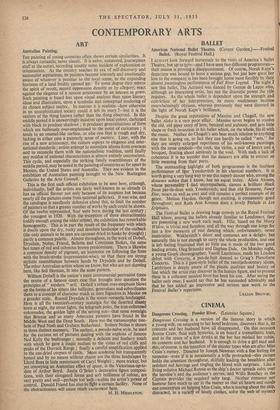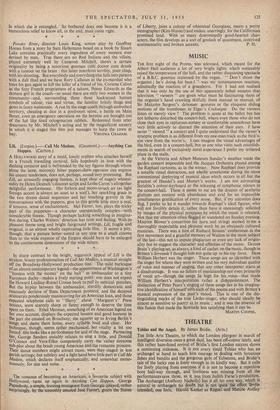CINEMA
Dangerous Crossing. Powder River. (Leicester Square.)
Dangerous Crossing is a version of the famous story in which a young wife, on returning to her hotel bedroom, discovers that it, its contents and her husband have all disappeared. On this occasion Jeanne CraM, fluid with hysterics, is on board a transatlantic liner, and in the space of a few drinks at the bar has mislaid her cabin, its contents and her husband. It is enough to drive a girl mad and this of course, is the intention of the sinister types who are after Miss Crain's money. Directed by Joseph Newman with a fine feeling for suspense—even if it is occasionally a trifle protracted—this picture holds the attention throughout, skilfully leading the breathless after redolent red herrings and tingling the blood with surprises. Like a living sedative Michael Rennie as the ship's doctor spreads calm over the heroine's and the audience's nerves, and Willis Bouchey as the Captain provides the required salty tang. Neither romance nor humour have much to say in the matter so that all hearts and minds can concentrate on helping Miss CraM, who is tearing about the ship, distracted, in a varietY of lovely clothes, solve the web of mystery
in which she is entangled. So bothered does one become it is a tremendous relief to know all, in the end, must come right.
* *
Powder River, director Louis King, screen play by Geoffrey Homes from a story by Sam Hellemann based on a book by Stuart Lake contains practically every ingredient of every western ever devised by man. True there are no Red Indians and the villain, Played extremely well by Cameron Mitchell, shows a certain originality by being a notorious gunman cum doctor cum drunk With a tumour on the brain : this latter interferes terribly, poor chap, with his shooting. But everybody and everything else falls into pattern with a dull thud and we have Rory Calhoun as the ex-marshal who totes his gun again to kill the killer of a friend of his, Corinne Calvet as the fizzy French proprietress of a saloon, Penny Edwards as the demure girl in the coach—as usual there are only two women in the community—and, surrounding these three hackneyed human symbols of valour, vice and virtue, the familiar bristly thugs and gents in fancy waistcoats. A run by the stage coach through ambushed territory, cheating at dice in a poolroom scene, a battle on Main Street, even an emergency operation on the heroine are brought out of the hat like tired octogenarian rabbits. Redeemed from utter dreariness by Mr. Mitchell's acting and by the magnificent scenery in which it is staged this film just manages to keep the yawn at



































 Previous page
Previous page